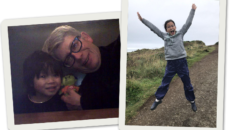Q: We have a 12-year-old (biological child) and are adopting a 10-year-old girl from foster care. My husband and I and our older daughter all have very similar (shy and reserved) personalities. For the first four months or so, the 10-year-old was very quiet, polite to the point of seeming almost fearful. As she’s relaxed in our family (which I’m happy about!), her true personality has come out, and it is very different from the rest of the family’s—boisterous, constantly chatting, likes to listen to loud music, etc. She often wants to go out to do things or have friends over when the other three of us would rather have a quiet evening in. I know biological families can and do manage having very different personalities, so I feel awful asking about this, but I’m frankly exhausted and having a hard time adjusting to hers. I also worry about her feeling “different,” since the rest of us are so similar. (The funny thing is, she looks very similar to us, so a stranger would not pick us out as an adoptive family.) We are committed to having her in our family, so what could you suggest for bridging the gap in our personalities?
A: Well, you are right about biological families having the same issue. Neither you, your husband, biological daughter, or adopted daughter are about to change personalities, so I guess all of you will have to understand cooperation and give and take in relationships. As the parents, you can decide whether she is allowed friends for an overnight every two weeks or once a month, once a week after school, etc., or whatever parameters seem fair. Then, when she asks for more, you can say, “Sorry, the family rule is once a week, but you will live here next week, too, and can have a friend over then.” This is more fair to her than simply giving in and trying to get her to like you. The non-stop chatter is a common behavior in children who have experienced early neglect. You can catch her when she is quiet and say, “I still know you are here, even though you are quiet.” Loud music? Buy her headphones. If she is dramatic, get her into school or community theater groups.
As far as feeling different, she is different, unless you have also been in foster care. She was probably separated from siblings, likely had a history of abuse, neglect, or abandonment, and has been placed in at least one new family. You can verbally mention what is the same. For example, “I notice we all love the beach [or potato chips, or singing].” Since she looks like you, have a formal portrait taken and hang it up in your home. Do some fun family things, like all wear the same colored shirt to a party, make a meal with only p foods (like pizza, pumpkin pie, and punch). Can your quiet times in sometimes be family times, like playing board games or watching a movie together?
All of you are adjusting, so be patient and give yourself time.

